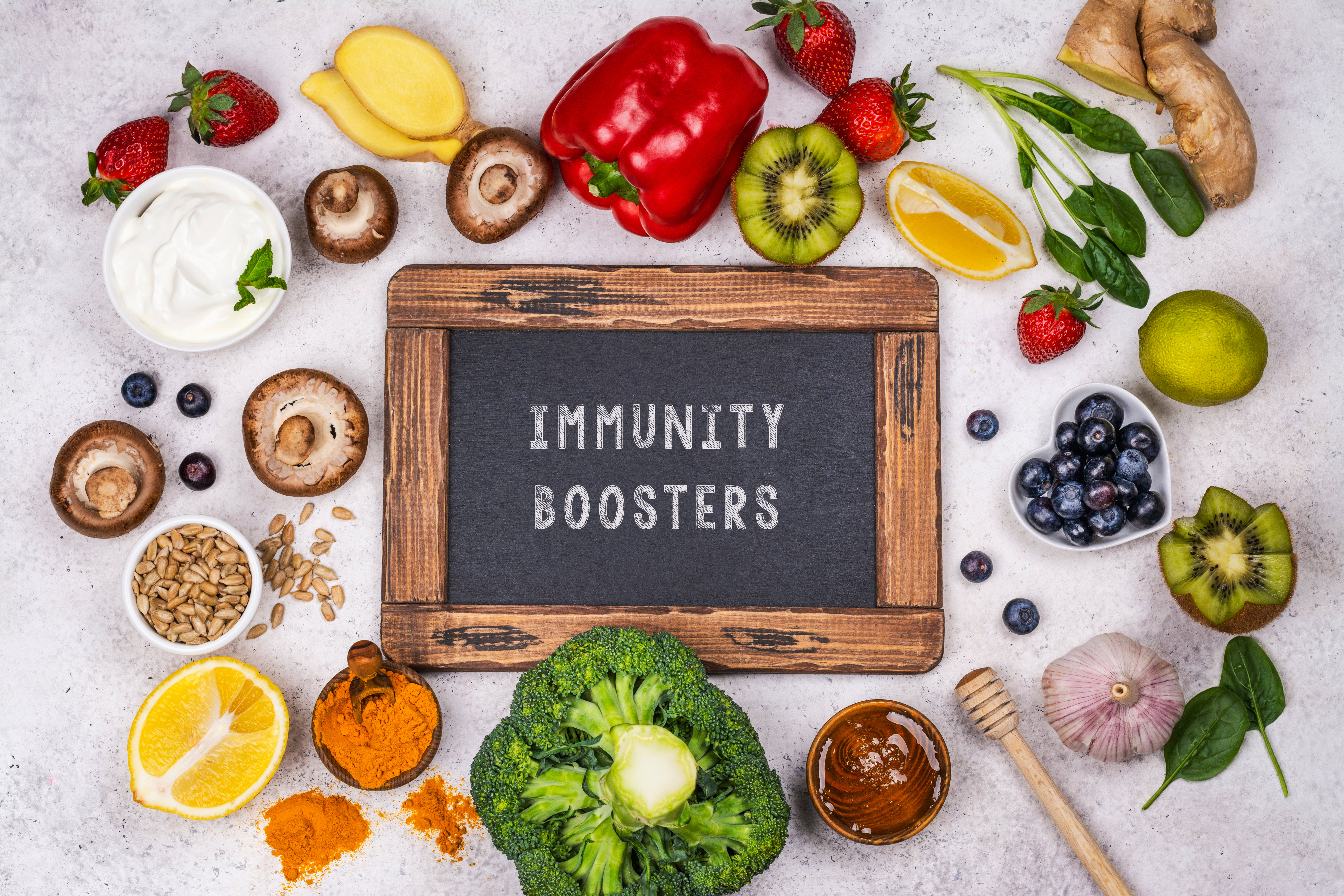Adapted from Optimum Nutrition Autumn 2019
Nutrition
Our immune systems do a remarkable job at defending us against disease-causing microorganisms. But as we head into the colder months, they may need a helping hand. Nutrition can be a good place to start.
Eat well
Poor nutrition has been found to increase the risk of infection and lead to compromised immunity, so limit sugary snacks and highly processed meals.
Selected micronutrients play a fundamental role in how well (or not) our immune system works, and it’s much easier to fit these into meals if you’re not filling up with empty calories (i.e. foods that are low in nutrients) every few hours.
Micronutrients identified for a well-functioning immune system include vitamins A, C, D, E, B2, B6 and B12 as well as folic acid, iron, selenium and zinc. Replenish micronutrients by eating a rainbow diet over the course of the week.
Fruit and vegetables
Choose seasonal varieties; turnip, swede and carrots as well as sweet peppers, spinach and kale in the winter, and aubergines, courgettes, strawberries, radish and tomato in the summer. A benefit to eating this way is that it feeds helpful bacteria in the gut, which play a fundamental part in regulating a healthy immune response, ensuring the body can recognise invaders and distinguish them from healthy body tissue.
Vitamins C & A
Infections significantly deplete the body’s vitamin C stores, due to inflammation onset as well as the body’s increased metabolic requirements in times of illness. Sugar competes with vitamin C for uptake into cells, so replace sugary sweet treats with citrus fruit.
Other vitamin C-rich foods such as berries, kiwi, mango and sweet peppers, in addition to eating your greens at meal times (e.g. broccoli, Brussels sprouts, kale and mustard or collard greens), will mean that you are instantly adding more immune-supporting vitamins, minerals and antioxidants to your diet — whilst cutting out the foods that can leave you feeling lethargic an hour later.
For dessert, choose berries — these are rich in polyphenols — served with natural, organic yoghurt to feed beneficial gut bacteria. As well as providing lots of vitamin C in the diet, opting for yellow, orange, red and green, leafy veg will also mean a good supply of beta-carotene and it can also help you work towards your 10-a-day. Beta-carotene can be converted to vitamin A, which helps support the body as it fights off infection and illness. It’s also important for skin and mucous membrane health, enhancing the body’s initial barriers against infection.
Vitamin D
Vitamin D deficiency is more likely to be a problem during winter, when there are fewer daylight hours. It is thought that vitamin D deficiency may be associated with sub-optimal immune function and an increased risk of infection. Consult with your GP or a registered nutritional therapist before supplementing vitamin D.
Good food sources include oily fish such as mackerel, sardines and salmon, as well as egg yolks. Vegetarians and vegans can get vitamin D through some mushrooms (check the label) and some fortified foods such as plant milks or nutritional yeast.
Fabulous foods
Garlic contains compounds that help support immune function. In a study designed to assess the effectiveness of aged garlic extract (AGE) supplements, a group of healthy volunteers who took AGE suffered less severe colds and flu, with fewer school or work days missed. This is thought to be due to the AGE increasing immune-supporting cell proliferation and activation.
Echinacea, long used as a defence against the common cold, may shorten the duration of a cold but there is no evidence to suggest that it can prevent us from catching a cold in the first place.
Curcumin, which is found in turmeric, may also have potential benefits for improved immune function. When adding turmeric to soups, stews, stir-fries and warmed plant milks, add a sprinkle of black pepper. This is because curcumin needs piperine, which is found in pepper, to absorb.
Zinc (found in lentils, beans, chickpeas, hemp, pumpkin, squash and sesame seeds, cashews, almonds, pine nuts, oats and grass-fed red meat) is also thought to be beneficial in cold prevention. However the NHS advises caution against taking zinc supplements because high doses can reduce the amount of copper the body can absorb. Instead, it suggests that adequate zinc can be obtained through a varied and balanced diet.
Other nutrients to consider are betaglucans (found in oats, barley, shiitake mushrooms and seaweed), which may help up-regulate and enhance the immune system, since it identifies them
NB: A varied colourful diet, of unprocessed or minimally processed foods, low in sugar should increase your intake of a range of vitamins and minerals. However, if you do think that you need support, rather than self-supplementing, seek advice from a registered nutritional therapist who is a member of BANT and the CNHC — they can advise on brand, dosage and drug and nutrient interactions. Consult your GP or a pharmacist if taking prescribed medications.






